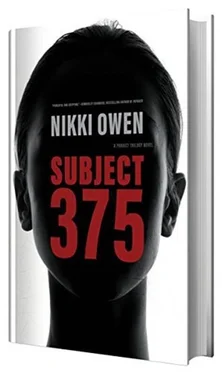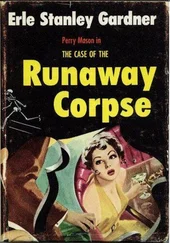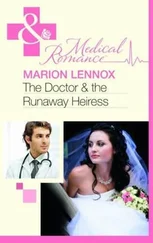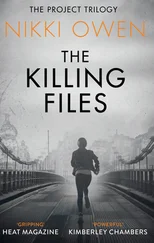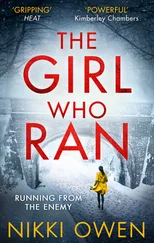‘Charging at two hundred. Clear!’
The medical team stands back as the doctor puts the paddles on Patricia’s chest. Her body rises suddenly at the shock, and then falls.
The nurse consults the monitor. ‘Nothing.’
But the doctor is already pulling up some adrenaline. He flicks the needle and injects it into Patricia’s vein. ‘Ten mils of adrenaline going in. Obs?’
I look at her. Please, I want good news. ‘Still no response,’ says the nurse. ‘She’s asystolic.’
‘Paddles,’ says the doctor. ‘Charge at two sixty. Clear!’
Patricia’s body rises and falls as she is shocked.
The doctor waits. ‘Come on.’
My pulse pounds through my veins and if I could give it, if I could give my life, my blood to Patricia right here, right now, I would.
The nurse checks the monitor. ‘No output.’
‘What happened?’ I look up. Dr Andersson. She is standing in the doorway.
‘She tried to hang herself,’ I say, my voice flat, pale.
The doctor stands back. ‘Still no output.’
Patricia’s chest does not move.
‘Maria,’ Dr Andersson says, ‘do you want me to take you to get another appointment with your barrister? You’ve missed your slot. We can speak to the legal advisor.’
Harry Warren-I had forgotten.
‘Maria,’ she says softly.
There is still no output on the monitor. Patricia. She is my only friend.
‘Maria?’ Dr Andersson says. ‘Do you want me to-’
‘Yes.’
‘Charge at three sixty!’
I spin round. The nurse’s eyes are wide. ‘Doctor, I don’t think we should-’
‘Three sixty, nurse!’ The doctor shouts. ‘Clear!’
‘Maria, let’s go,’ Dr Andersson says, but I ignore her, not able to drag myself away, to be parted again from someone I care about. The doctor shocks Patricia with the defibrillator.
The nurse shakes her head. ‘She’s not responding.’
‘No!’ I rush forward, pleading, wild. ‘Try again. You must try again!’ I attempt to grab the defibrillator then stop. There is a red line running across the monitor screen. That means no output. No response.
No life.
‘Martinez!’ the guard shouts.
The doctor steps back, shakes his head.
‘You have to call it,’ says a nurse.
The doctor raises his wristwatch.
‘No!’ I scream, and before anyone can stop me, before anyone can realise what I am doing, I grab the defib paddles and thrust them to Patricia’s chest. ‘Clear!’
As the current hits her, she rises and falls once more, sharp, jerking, a bolt of a spark. I hold the paddles in the air, breath heavy, watching the monitor, time standing still. The guard dashes to me, ripping the paddles from my hand, shoving me to the side, my back thudding against the wall, but still I watch, wait. The red line. I count. One-two-three-four-five.
‘Doctor,’ the nurse says quietly, ‘you have to call it.’
A beat appears on the monitor.
‘We have a response!’ says the nurse. She scans the monitor, checks as the red line once again rises and falls. ‘She’s got good femoral output and sinus tachy.’
I hang my head, drained, utterly spent of energy, my body slack, my nerves raw, wounded. She’s not clear yet, I know that, but I can’t lose her. I can’t.
The doctor checks Patricia’s pulse by her neck and nods to Dr Andersson. She walks over to me with a guard next to her. ‘Maria, let the medical team do their job now.’
Patricia is being moved on the trolley, its steel bars, its medical tubes clinking. I pause, then, turning, remember something: my writing pad. I reach up, slide it out from the Bible on the shelf, my eyes on Patricia the entire time.
Without a word, I wipe my eyes and follow Dr Andersson out of the cell. The sound of Patricia’s trolley being rushed to the hospital wing echoes in the heavy, clammy air, inmates gawping, spying on us, on what is happening, as if it is entertainment, popcorn viewing. My hands shaking, I grip my notebook and follow Dr Andersson to the legal office.
I don’t know if Patricia will live or die.
When we arrive, the legal advisor is still there. I stop, write down everything I recalled in Dr Andersson’s office; Dr Andersson explains to the legal advisor that I require another appointment with Harry Warren. But agitation driven by fear, fear at losing my friend, makes me speak up, makes me impatient.
‘I require another appointment as soon as possible.’ The words speed out. ‘My cellmate hung herself.’ I stop. The phrase, uttered aloud, hits me like a smack in the face. I stumble back, dazed a little, suddenly wondering where I am.
‘Maria…’
But I ignore Dr Andersson and look at the legal advisor, eager to explain, to make her-anyone-understand. ‘I am late because my friend attempted suicide. She used her socks. Ha!’ I say, for some reason finding this funny, ‘And they were mountain socks. Winter ones. I should have known-I am not stupid. Not stupid. I should have known you don’t have thick mountain socks in prison. I had seen Patricia with them. I did not realise she would try to kill herself with them. And then I had a therapy session with Dr Andersson. I returned to my cell, because I had forgotten my notes. I do not forget, but I did. It is this prison, this place. I walked in and I…I…’
Dr Andersson steps towards me. ‘Breathe. You couldn’t have known. Breathe.’
I cup my hands in front of my mouth. ‘I am breathing,’ I say, gulping in air, my lungs beginning to slow. ‘If I did not breathe, I would be dead.’
Dr Andersson sighs. The legal advisor raises her hand. ‘Er, can I just say something?’
We both look at her.
She points to the interview room. ‘The barrister your inmate came to see? Harry Warren?’
‘Yes?’ Dr Andersson says.
She glances between the two of us. ‘He’s still here,’ she says. ‘Mr Warren is still in the interview room.’
A tray of sandwiches sits on the table.
Kurt is standing by the window. He has a plate in his hand and on it are two triangle-shape sandwiches, each containing tuna and mayonnaise. I uncross my legs, lean forward and pick through the bread. I select a ham sandwich, discard the tomato and bite. It tastes of sugar and fat.
Kurt turns away from the bars. He dabs his hand with a serviette and returns to his seat. His plate down, he brushes his palms together and, flashing me a smile, picks up his Dictaphone.
‘We are going to recommence our discussion now.’
I swallow the sandwich. ‘Now?’
He says nothing and clicks the record button. ‘I want to talk to you about father figures.’
‘I do not understand.’ I wipe my mouth with my palm and shiver.
‘A father figure is a man who is older and is regarded by someone younger as a person who has paternal qualities-fatherly qualities-and therefore may be a substitute for a father, emotionally. Someone who fills a void.’
This is not a phrase I am familiar with. ‘Is that a dictionary definition?’
He stares at me before speaking again. ‘Maria, do you think the Governor-Balthus Ochoa-may be a father figure?’
‘To whom?’
‘To you, Maria.’
I tap my finger. A whisper tells me I have to tread carefully here. Think. What does he expect me to say? ‘I have a father,’ I say, after a moment.
‘Had.’
I stay still. Had a father. Past tense. How much about Papa and me does Kurt know, does the service he works for know?
The door opens and the woman from earlier-leather jacket, bob, girlfriend, eyes-enters with coffee. She throws Kurt one brief smile then removes the uneaten sandwich tray and replaces it with a pot and cups. One more smile and the woman exits, leaving a vapour of Calvin Klein perfume behind her. Kurt leans forward, pours a coffee and hands it to me.
Читать дальше
Конец ознакомительного отрывка
Купить книгу
